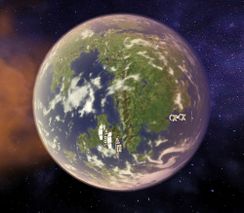
|
This wiki is closed in favour of the new wiki. Information shown is likely to be very out of date. |
Difference between revisions of "Planet Orleans"
m (Image added and sector edited.) |
|||
| Line 1: | Line 1: | ||
| − | {{Version|4. | + | {{Version|4.89}} |
{{Planet Infobox | {{Planet Infobox | ||
| name = Planet Orleans | | name = Planet Orleans | ||
| Line 15: | Line 15: | ||
| escape_velocity = 11.15 km/sec | | escape_velocity = 11.15 km/sec | ||
}} | }} | ||
| − | Planet Orleans was the second permanently inhabited world of [[Gallia]] after [[ | + | Planet Orleans was the second permanently inhabited world of [[Gallia]] after [[New Paris]]. Gallic explorers found a stable jumphole leading from Isle de France into [[Orleans]] as early as 60 A.G.S., and after establishing that the jumphole was safe to traverse, explorers were sent through. The planet was found less then a year later. Settlement of Planet Orleans began half a century later, after studies showed that, while cold, the climate was suitable for human life. |
| − | The planet is | + | The planet is ancient compared to New Paris, having been formed more than 9 billion years ago. Primitive cellular life forms appeared on the planet over 2 billion years ago. Despite it's lifespan, the cold climate has caused evolution to be slow on the planet, with most lifeforms still being algae and other microorganisms inhabiting it's vast oceans. Over the past years, the biosphere has been severely altered by various plant and animal species brought in from New Paris, mainly by the many farmers of Orleans. The planet is still largely rural, with a few mining colonies in operation by the [[Gallic Metal Service]]. The current population is estimated to be around 5.7 million people. |
| − | |||
==Missions Offered== | ==Missions Offered== | ||
No missions offered here | No missions offered here | ||
Revision as of 09:46, 6 April 2018
| Planet Orleans | |
| Owner | Gallic Royal Police |
| Location | F3, Orleanais |
| Technical information | |
| Population | unknown |
| Docking | Yes |
| Terrain | Terrestrial |
| Diameter | 11,947 km |
| Mass | 5.76 x 10e24 kg |
| Temperature | -72°C to 48°C |
| Escape velocity | 11.15 km/sec |
Planet Orleans was the second permanently inhabited world of Gallia after New Paris. Gallic explorers found a stable jumphole leading from Isle de France into Orleans as early as 60 A.G.S., and after establishing that the jumphole was safe to traverse, explorers were sent through. The planet was found less then a year later. Settlement of Planet Orleans began half a century later, after studies showed that, while cold, the climate was suitable for human life.
The planet is ancient compared to New Paris, having been formed more than 9 billion years ago. Primitive cellular life forms appeared on the planet over 2 billion years ago. Despite it's lifespan, the cold climate has caused evolution to be slow on the planet, with most lifeforms still being algae and other microorganisms inhabiting it's vast oceans. Over the past years, the biosphere has been severely altered by various plant and animal species brought in from New Paris, mainly by the many farmers of Orleans. The planet is still largely rural, with a few mining colonies in operation by the Gallic Metal Service. The current population is estimated to be around 5.7 million people.
Missions Offered
No missions offered here
Bribes Offered
| Spoiler: |
|---|
|
Commodities
| Exports |
| Imports |
